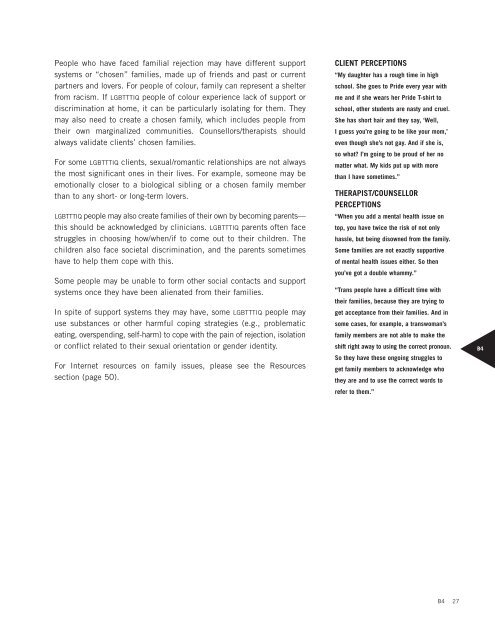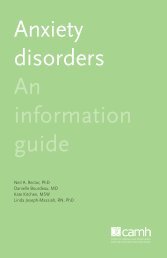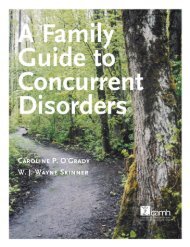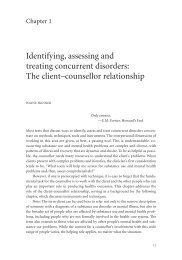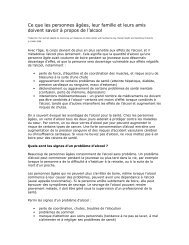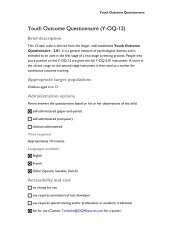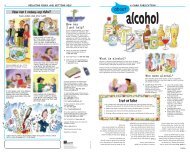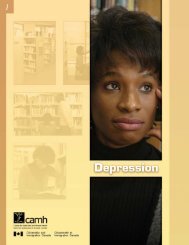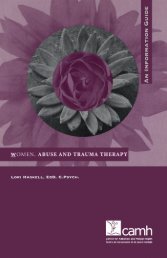Asking the right questions 2 - Rainbow Health Ontario
Asking the right questions 2 - Rainbow Health Ontario
Asking the right questions 2 - Rainbow Health Ontario
- No tags were found...
Create successful ePaper yourself
Turn your PDF publications into a flip-book with our unique Google optimized e-Paper software.
People who have faced familial rejection may have different supportsystems or “chosen” families, made up of friends and past or currentpartners and lovers. For people of colour, family can represent a shelterfrom racism. If LGBTTTIQ people of colour experience lack of support ordiscrimination at home, it can be particularly isolating for <strong>the</strong>m. Theymay also need to create a chosen family, which includes people from<strong>the</strong>ir own marginalized communities. Counsellors/<strong>the</strong>rapists shouldalways validate clients’ chosen families.For some LGBTTTIQ clients, sexual/romantic relationships are not always<strong>the</strong> most significant ones in <strong>the</strong>ir lives. For example, someone may beemotionally closer to a biological sibling or a chosen family memberthan to any short- or long-term lovers.LGBTTTIQ people may also create families of <strong>the</strong>ir own by becoming parents—this should be acknowledged by clinicians. LGBTTTIQ parents often facestruggles in choosing how/when/if to come out to <strong>the</strong>ir children. Thechildren also face societal discrimination, and <strong>the</strong> parents sometimeshave to help <strong>the</strong>m cope with this.Some people may be unable to form o<strong>the</strong>r social contacts and supportsystems once <strong>the</strong>y have been alienated from <strong>the</strong>ir families.In spite of support systems <strong>the</strong>y may have, some LGBTTTIQ people mayuse substances or o<strong>the</strong>r harmful coping strategies (e.g., problematiceating, overspending, self-harm) to cope with <strong>the</strong> pain of rejection, isolationor conflict related to <strong>the</strong>ir sexual orientation or gender identity.For Internet resources on family issues, please see <strong>the</strong> Resourcessection (page 50).CLIENT PERCEPTIONS“My daughter has a rough time in highschool. She goes to Pride every year withme and if she wears her Pride T-shirt toschool, o<strong>the</strong>r students are nasty and cruel.She has short hair and <strong>the</strong>y say, ‘Well,I guess you’re going to be like your mom,’even though she’s not gay. And if she is,so what? I’m going to be proud of her nomatter what. My kids put up with morethan I have sometimes.”THERAPIST/COUNSELLORPERCEPTIONS“When you add a mental health issue ontop, you have twice <strong>the</strong> risk of not onlyhassle, but being disowned from <strong>the</strong> family.Some families are not exactly supportiveof mental health issues ei<strong>the</strong>r. So <strong>the</strong>nyou’ve got a double whammy.”“Trans people have a difficult time with<strong>the</strong>ir families, because <strong>the</strong>y are trying toget acceptance from <strong>the</strong>ir families. And insome cases, for example, a transwoman’sfamily members are not able to make <strong>the</strong>shift <strong>right</strong> away to using <strong>the</strong> correct pronoun.So <strong>the</strong>y have <strong>the</strong>se ongoing struggles toget family members to acknowledge who<strong>the</strong>y are and to use <strong>the</strong> correct words torefer to <strong>the</strong>m.”B4B4 27


